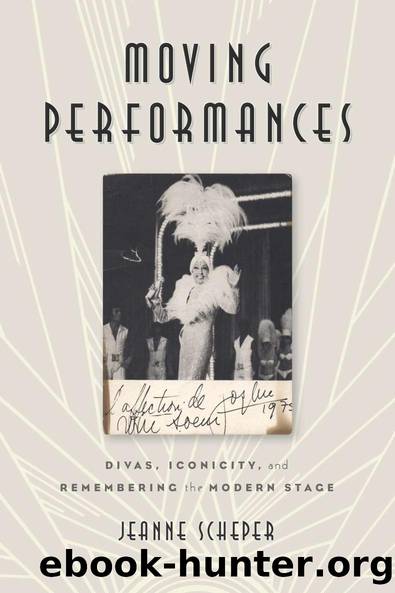Moving Performances by Jeanne Scheper

Author:Jeanne Scheper [Scheper, Jeanne]
Language: eng
Format: epub
Tags: Social Science, Women's Studies, Performing Arts, Theater, History & Criticism, Biography & Autobiography, Entertainment & Performing Arts, Ethnic Studies, American, African American & Black Studies, History, United States, 20th Century, Art, Performance, Music
ISBN: 9780813585468
Google: A_61DQAAQBAJ
Publisher: Rutgers University Press
Published: 2016-12-13T05:24:53+00:00
âOthers Are Only Passing for Coloredâ: Sonic Backtracks
Ethel Waters (1896â1977), jazz and blues singer, dancer, and comedienne, described her own style as ârefinedâ and âoutrageous.â Combining the two, Waters carved out a critical space within the black revues of the 1920s and 1930s where she got her start, cultivating herself as âQueen of the Double Entendre.â Embracing the sexual politics of the blues women, she sang about and had a reputation for bawdy and irreverent humor, which lent queer meaning and style to her work and public persona. She had the âreputation of a bulldagger.â30 And along with the other black performers of her generation, she navigated the treacherous terrain of a historical moment steeped in working on and against Reconstruction- and post-Reconstruction-era conventions of blackface minstrelsy and âcoonâ performances. In other words, audiences (and directors, producers, writers, and circuit managers) still expected, desired, and demanded the replication and invocation of retrograde antiblack stereotypes onstageâfrom blacks and from whites. Waters, like her predecessors, attempted to undercut such compulsory inhabitations with satiric humor, distance, and intramural critique with her black audiences.
If Holmanâs âwhole ambition was always to sound like Ethel Waters,â it was more than just a sonic desire. Waters began her career performing for black audiences on the Theater Owners Booking Association vaudeville circuit, which was made up (with two exceptions) of white-owned theaters catering to black audiences.31 Carby describes how blues women on the circuit challenged gender norms and how the circuit offered âan alternative way to achieve mobility for young women.â âThis increase in their physical mobility,â she argues, âparallels their musical challenges to sexual conventions and gendered social roles.â32 In the 1920s Waters recorded for Black Swan, the first black-owned label, whose advertising slogan wryly declared: âThe Only Genuine Colored RecordâOthers Are Only Passing for Colored.â She recorded her songs for these so-called race records, producing recordings aimed specifically at working-class black audiences, until the Depression. As one of the central figures of the early blues-recording industry in the 1920s and 1930s, she produced hundreds of recordings. An accomplished singer, dancer, and comedienne, she was featured in three black musical revues: Africana (1927), Blackbirds of 1930 (1930), and At Home Abroad (1935). She became known for her ability to âcross overâ between audiences, appealing to both black working-class and black middle-class audiences as well as to the white audience members coming to Harlemâs clubs in those years. Her most famous songs are today archived and remembered through her films, such as the song âAm I Blue?â from her role as Hagar in On with the Show (1929).
The persistency of this celluloid archive, with its particular capture of Waters, has the effect of distorting our understanding of the meaning of her stage performances and would render a statement like Holmanâs claim that her âwhole ambition was always to sound like Ethel Watersâ illegible. As the film Ethnic Notions, Marlon Riggsâs critical archive project on antiblack representations, powerfully illustrates, something happens to how Waters gets remembered when her performances are recorded and then made widely available through this visual medium.
Download
This site does not store any files on its server. We only index and link to content provided by other sites. Please contact the content providers to delete copyright contents if any and email us, we'll remove relevant links or contents immediately.
Kathy Andrews Collection by Kathy Andrews(10505)
The remains of the day by Kazuo Ishiguro(7539)
Spare by Prince Harry The Duke of Sussex(4188)
Paper Towns by Green John(4163)
The Body: A Guide for Occupants by Bill Bryson(3788)
Be in a Treehouse by Pete Nelson(3204)
Harry Potter and the Goblet Of Fire by J.K. Rowling(3023)
Goodbye Paradise(2948)
Never by Ken Follett(2868)
Into Thin Air by Jon Krakauer(2694)
The Remains of the Day by Kazuo Ishiguro(2613)
The Genius of Japanese Carpentry by Azby Brown(2601)
The Cellar by Natasha Preston(2591)
Drawing Shortcuts: Developing Quick Drawing Skills Using Today's Technology by Leggitt Jim(2525)
120 Days of Sodom by Marquis de Sade(2426)
Architecture 101 by Nicole Bridge(2348)
The Man Who Died Twice by Richard Osman(2289)
Machine Learning at Scale with H2O by Gregory Keys | David Whiting(2262)
Fairy Tale by Stephen King(2058)
